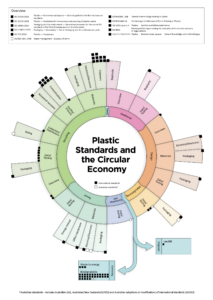Leveraging standards and best practices to reduce plastic waste
Presentations from Chemistry Australia and Standards Australia about work in the standards space and CSIRO’s Standards Mapping project to identify what standards exist in Australia. Download a PDF copy of the presentations given at the Symposium here:
- Best practices and standards to reduce plastic waste: current landscape and future directions – Qamar Schuyler (CSIRO)
As Australia moves towards a more circular plastic economy, best practice guidelines and standards will be critical to enable rapid change. These tools will assist industry, government, and individuals in attempts to reduce plastic waste. But how is Australia positioned in the development of these important support mechanisms? This overview will provide a global context and set the scene for the panel presentations that follow. The session will culminate with a robust discussion designed to elicit input from the plastic community on critical future directions and priorities.
- The role of standards for a strong circular economy – Peter Bury (Chemistry Australia)
[no abstract available]
- Plastic waste: the role of standards and current landscape – Stephanie Groves (Standards Australia)
Standards play a crucial role in facilitating the transition to a circular economy by establishing common definitions, measurements, and guidelines for industry, government, and consumers. In the context of plastics, standards can address issues such as traceability, provide guidance on recovery and recycling, outline test methods for biodegradability, and measure the environmental footprint of biobased plastics. A review of key national and international committees reveals Australia’s absence from the international plastic standards landscape, highlighting the opportunity for Australian experts to shape the development of international publications. This presentation emphasises the role of standards as a tool to combat plastic waste and looks at next steps to bolster Australia’s active participation in global standards development.
- Australia becoming a global super-circular economy – Helen Millicer (One Planet Consulting)
Better use of certifications and standards will help Australia become a Circular Economy leader. Currently Australia has a ‘go low and go slow’ approach to using labels, certifications and applying environmental standards in its procurement and industry strategies. As plastics production has a high resource and GHG emission impact, Australia is facing real risks and challenges in continuing its current linear and high emissions and high plastics consumption levels. Despite Australia’s need to implement a more circular plastics economy, Australia’s incentives and approach remain around linear, Business as Usual systems that incentivise and prioritise high consumption and easy disposal. A key way forward is to use existing industry and government backed standards and certifications far better. We can adopt similar tactics to those used in European nations. In this presentation I set out the steps Australia needs to take, as set out in our national report, Enabling Design for Environmental Good, published in March by the Australian Government. The ten recommendations set out the steps to increase uptake of circular products and phase out non-repairable and non-recyclable products, including aligning with global best product labels, certifications and processes.

